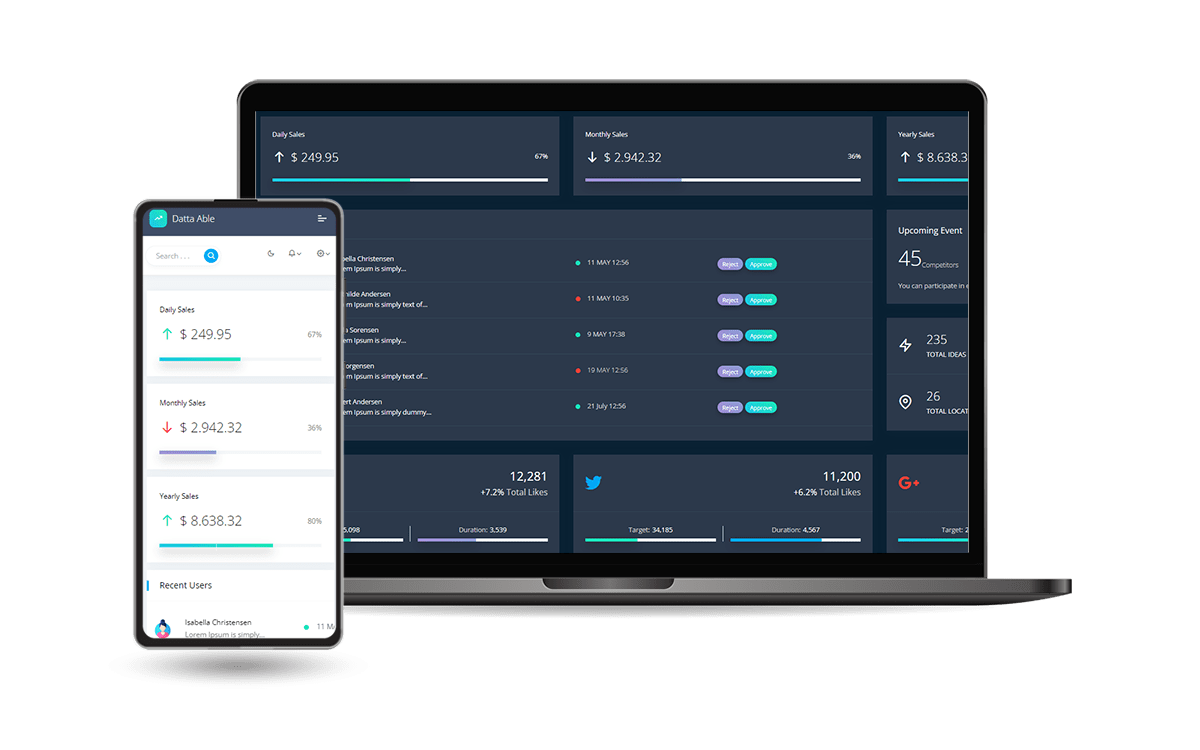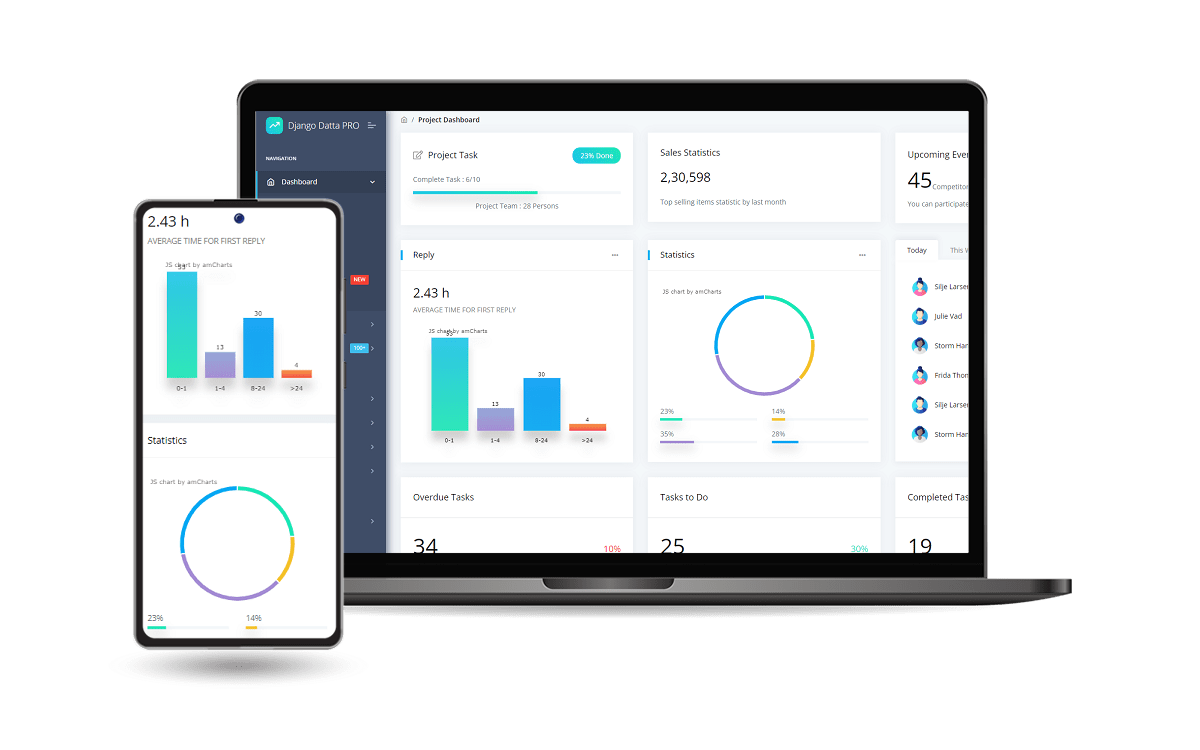Open-source Flask Dashboard generated by AppSeed op top of a modern design. Datta Able Bootstrap Lite is the most stylised Bootstrap 4 Lite Admin Template, around all other Lite/Free admin templates in the market. It comes with high feature-rich pages and components with fully developer-centric code. Before developing Datta Able our key points were performance and design.
- 👉 Datta Able Flask -
Product page - 👉 Documentation -
Learn how to use and update the product - 🚀 Free support for registered users (Email &
Discord)
Built with App Generator, timestamp
2022-10-06 21:53
Up-to-date dependencies- Database:
mysql DB Tools: SQLAlchemy ORM, Flask-Migrate (schema migrations)- Session-Based authentication (via flask_login), Forms validation
Dark Mode(enhancement)- Persistent via browser
local storage
- Persistent via browser
Step 1 - Download the code from the GH repository (using
GIT)
$ # Get the code
$ git clone https://github.com/appseed-projects/<YOUR_BUILD_ID>.git
$ cd <YOUR_BUILD_ID>Step 2 - Edit
.envand setDEBUG=True. This will activate theSQLitepersistance.
DEBUG=TrueStep 3 - Start the APP in
Docker
$ docker-compose up --build Visit http://localhost:5085 in your browser. The app should be up & running.
Note: Make sure your Mysql server is properly installed and accessible.
Step 1 - Create the MySql Database to be used by the app
Create a new MySqldatabaseCreate a new userand assign full privilegies (read/write)
Step 2 - Edit the
.envto match your MySql DB credentials. Make sureDB_ENGINEis set tomysql.
DB_ENGINE:mysqlDB_NAME: default value =appseed_dbDB_HOST: default value =localhostDB_PORT: default value =3306DB_USERNAME: default value =appseed_db_usrDB_PASS: default value =pass
Here is a sample:
# .env sample
DEBUG=False # False enables the MySql Persistence
DB_ENGINE=mysql # Database Driver
DB_NAME=appseed_db # Database Name
DB_USERNAME=appseed_db_usr # Database User
DB_PASS=STRONG_PASS_HERE # Password
DB_HOST=localhost # Database HOST, default is localhost
DB_PORT=3306 # MySql port, default = 3306 Download the code
$ # Get the code
$ git clone https://github.com/appseed-projects/34fa5375-7f77-47a4-a945-88503da1b3b3.git
$ cd 34fa5375-7f77-47a4-a945-88503da1b3b3Install modules via
VENV
$ virtualenv env
$ source env/bin/activate
$ pip3 install -r requirements.txtSet Up Flask Environment
$ export FLASK_APP=run.py
$ export FLASK_ENV=developmentStart the app
$ flask runAt this point, the app runs at http://127.0.0.1:5000/.
Install modules via
VENV(windows)
$ virtualenv env
$ .\env\Scripts\activate
$ pip3 install -r requirements.txt
Set Up Flask Environment
$ # CMD
$ set FLASK_APP=run.py
$ set FLASK_ENV=development
$
$ # Powershell
$ $env:FLASK_APP = ".\run.py"
$ $env:FLASK_ENV = "development"Start the app
$ flask runAt this point, the app runs at http://127.0.0.1:5000/.
By default, the app redirects guest users to authenticate. In order to access the private pages, follow this set up:
- Start the app via
flask run - Access the
registrationpage and create a new user:http://127.0.0.1:5000/register
- Access the
sign inpage and authenticatehttp://127.0.0.1:5000/login
The project is coded using blueprints, app factory pattern, dual configuration profile (development and production) and an intuitive structure presented bellow:
< PROJECT ROOT >
|
|-- apps/
| |
| |-- home/ # A simple app that serve HTML files
| | |-- routes.py # Define app routes
| |
| |-- authentication/ # Handles auth routes (login and register)
| | |-- routes.py # Define authentication routes
| | |-- models.py # Defines models
| | |-- forms.py # Define auth forms (login and register)
| |
| |-- static/
| | |-- <css, JS, images> # CSS files, Javascripts files
| |
| |-- templates/ # Templates used to render pages
| | |-- includes/ # HTML chunks and components
| | | |-- navigation.html # Top menu component
| | | |-- sidebar.html # Sidebar component
| | | |-- footer.html # App Footer
| | | |-- scripts.html # Scripts common to all pages
| | |
| | |-- layouts/ # Master pages
| | | |-- base-fullscreen.html # Used by Authentication pages
| | | |-- base.html # Used by common pages
| | |
| | |-- accounts/ # Authentication pages
| | | |-- login.html # Login page
| | | |-- register.html # Register page
| | |
| | |-- home/ # UI Kit Pages
| | |-- index.html # Index page
| | |-- 404-page.html # 404 page
| | |-- *.html # All other pages
| |
| config.py # Set up the app
| __init__.py # Initialize the app
|
|-- requirements.txt # App Dependencies
|
|-- .env # Inject Configuration via Environment
|-- run.py # Start the app - WSGI gateway
|
|-- ************************************************************************For more components, pages and priority on support, feel free to take a look at this amazing starter:
Designed for those who like bold elements and beautiful websites, Datta Able is the most stylish Bootstrap 4 Admin Template compare to all other Bootstrap admin templates. It comes with high feature-rich pages and components with fully developer-centric code.
- 👉 Flask Datta PRO - product page
- ✅
Enhanced UI- more pages and components - ✅
Improved Authentication, Password Strength Checker - ✅
Automatic User Suspensionon multiple failed logins - ✅
Extended User profile - ✅
Users Management(restricted to admins)
- ✅
Datta Able Flask - Open-source starter generated by AppSeed Generator.

